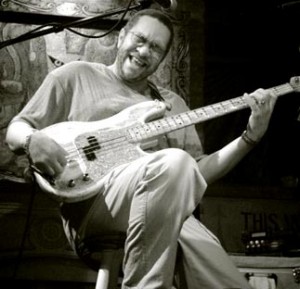 –Word has been floating around about George Porter, Jr.’s legal issues with his former management, Highsteppin’ Productions. Neither Porter nor his lawyer are talking on the record, so here’s the most complete account of what’s going on so far:
–Word has been floating around about George Porter, Jr.’s legal issues with his former management, Highsteppin’ Productions. Neither Porter nor his lawyer are talking on the record, so here’s the most complete account of what’s going on so far:
Legendary New Orleans bassist George Porter Jr., best known for his work with The Meters, played to thousands of music fans this past weekend at a New Jersey festival – but he’ll only be pocketing three-quarters of the money that he earned from the gig.
The other quarter will go to an escrow account a Boston judge has ordered Porter, along with his former bandmates guitarist Brian Stoltz and drummer Russell Batiste Jr., to set up pending resolution of a lawsuit brought by the Somerville-based manager of their erstwhile group Porter Batiste Stoltz.
The manager, Phil Stepanian of Highsteppin’ Productions, claims that the three members owe him hundreds of thousands of dollars in expenses for crew members and travel costs as well as for loans he made.
–In an interesting piece at the Columbia Journalism Review looking at The Times-Picayune post-K, Douglas McCollam quotes the highly quotable David Simon:
As David Simon, who has been camped out in New Orleans for much of the year making his HBO series Treme (he did some filming at the T-P’s headquarters), once observed, the idea that newspapers can somehow do “more with less” is a great fiction of modern media. “You do less with less,” Simon quipped. “That’s why they call it less.”
–One of my favorite New Orleans releases this year is Ben Ellman and DJ Quickie Mart’s Gypsyphonic Disko mixtape (a high point – merging B.G.’s “Move Around” and Kelis’ “Milkshake” with a hip-hop beat and an accordion and clarinet playing Eastern European folk music). Other mixtapes that are speaking to me right now: Eccentric Breaks and Beats (a DJ builds mixes only out of obscure soul released by the Numero Group, giving it an old school and new school vibe at the same time) and A-Trak’s Dirty South Dance 2. He takes southern hip-hop, including tracks by Lil Wayne and Ludacris, and replaces all remnants of crunk, bounce and southern sludge with sleek, nimble beats. It’s almost as world-crossing a feat as Gypsyphonic Disko.
–The DVD is coming out of the documentary Who Killed Nancy? by Alan G. Parker (not the Alan Parker who made Fame, The Wall, Mississippi Burning and The Commitments). It’s yet another look at the relationship between Sid Vicious and Nancy Spungeon, and Parker suggests that Vicious was too wasted on drugs the night of her murder to have killed her, and hints strongly that a drug dealer who lived a few floors from them in New York’s Chelsea Hotel might be the guy.
As a whodunit and as an argument, it’s slim stuff, with the feel of generic conspiracy theory. The interview subjects were largely scenesters and marginal musicians for whom the high point of their personal and professional lives was existing in Sid and the Sex Pistols’ orbit. Howie Pyro (ex- of D Generation) almost gurgles with excitement when he enters the room that Sid and Nancy shared. Glimpses into those lives and the drug culture that surrounded the punk scene gives the movie its reason to live. That and all the dyed black hair and wigs—it’s easy to forget that punk had a glam undercurrent, even it was an anti-glam glam.




